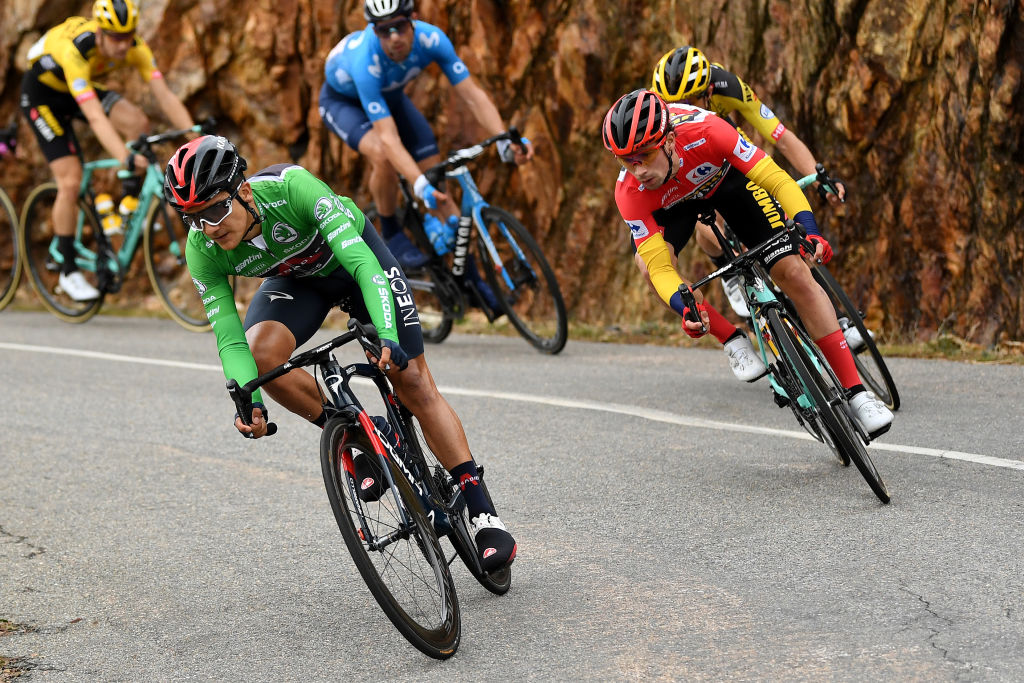Carapaz settles for second in Vuelta a España after devastating late charge
Ecuadorian's gutsy late attack almost blew the GC race apart

Richard Carapaz’s second all-out battle for a Grand Tour in two years with Primož Roglič (Jumbo-Visma) ended in the most dignified of defeats as the Ecuadorian threw everything he could at Roglič on the final kilometres of the race’s final summit finish on stage 17, and the Ineos Grenadiers racer only came up short by the narrowest of margins.
Despite being isolated from his team on the final climb of the Vuelta a España, after Hugh Carthy (EF Pro Cycling) opened up the GC battle with two attacks, Carapaz quickly regained contact with the Briton, dragging Roglič in his wake, and the Ecuadorian then had no problems blasting away in the last two kilometres.
Storming past some of the distanced riders from the early break of the day, Carapaz showed no sign of letting up on the exposed roads, despite the extremely strong headwind.
Eighth on the line and finally 21 seconds ahead of Roglič, the 2019 Giro d’Italia winner could not topple the Slovenian from his top spot overall in a second Grand Tour. But when it came to giving Roglič a run for his money, Carapaz - twice the leader of the race after the Formigal and Angliru stages - could be more than proud of his runner-up spot in Madrid.
Asked about the controversial moment of the last mountain stage, when Roglič was able to benefit from the work done by Marc Soler in favour of teammate Enric Mas (Movistar) in his pursuit of the Ecuadorian, Carapaz said simply “no comment, I’ve got nothing to say.
“Each person has their own objectives, I’ve got mine. So no comment.”
As to whether Carapaz would have won the Vuelta if Roglič had been more isolated in the final kilometres, Carapaz responded: “I don’t know. Maybe.
Get The Leadout Newsletter
The latest race content, interviews, features, reviews and expert buying guides, direct to your inbox!
“But what happened, happened. I’ll settle with my second place, and how I enjoyed racing today. Getting second is a great result, too.”
Carapaz admitted that it had not been straightforward racing with two fewer teammates after Colombian Brandon Rivera and Pole Michal Golas both had to quit the race. “In a team of eight riders, losing two mattered a lot,” he said, “but under the circumstances, we did a great job. I’ve always tried to stay in the action, and fight as hard as possible for this race.
“Of course I wanted to win the Vuelta but I’m finishing this season feeling very satisfied with my second place overall. And above all, we know that for another time, we’ll have a team that’s fully competitive.”
Apart from having a weaker team that he might have liked, it's also to his credit that while Carapaz’ season has not been a straightforward one, he has dealt with the team switching him from the Giro d’Italia to the Tour. The Ecuadorian was subsequently designated leader by Ineos Grenadiers for the Vuelta, a race he had not originally expected to do, either.
Asked if he felt he had earned the right to tell the team which races he wanted to do next year after finishing second in the Vuelta, Carapaz did not deliver a clear yes or no.
“First off, we have to see how we live through this situation,” he said in reference to the pandemic. “Next season. We also have to see what each of the [Grand Tour] routes look like. We know what the Tour route will be, but then there’s the Giro and Vuelta. After we’ve got to see the routes and then, sure, we’ll be going for a Grand Tour.” However, in a team that will be crammed with GC Grand Tour candidates, perhaps wisely, he did not specify which he would prefer.
As for the narrowness of Rogič’s final advantage, and the fact that a great deal of the Jumbo-Visma leader’s time gap had come through time bonuses, Carapaz was adamant that he had ridden his own Vuelta correctly, or as he put it, “I don’t have any kind of bitter taste in my mouth.
“I raced as hard as I could and the best I could. If I didn’t get more bonus seconds, that was how it was. I have no regrets.”
Alasdair Fotheringham has been reporting on cycling since 1991. He has covered every Tour de France since 1992 bar one, as well as numerous other bike races of all shapes and sizes, ranging from the Olympic Games in 2008 to the now sadly defunct Subida a Urkiola hill climb in Spain. As well as working for Cyclingnews, he has also written for The Independent, The Guardian, ProCycling, The Express and Reuters.
